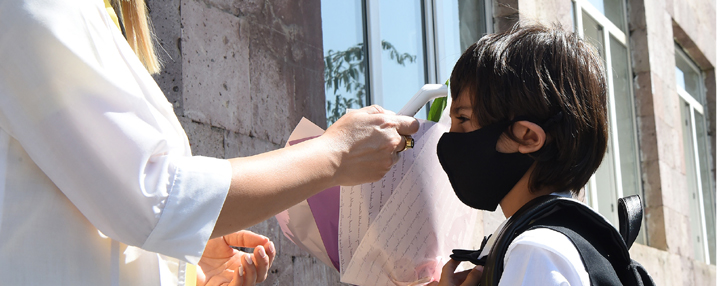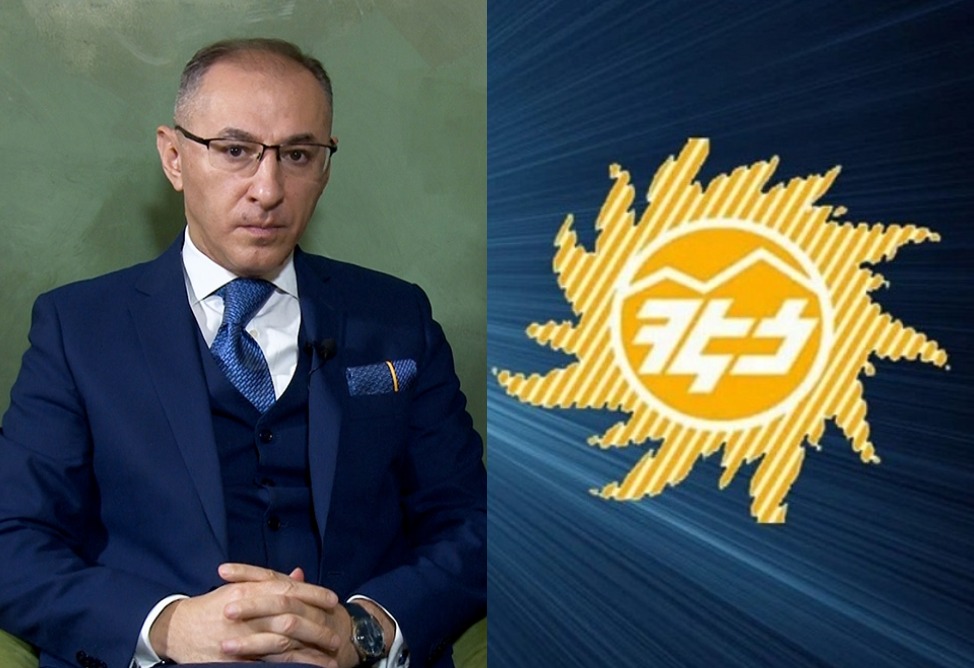Infectious disease doctor finds masks not necessary in schools
24.09.2020,
12:36
Armen Ohanyan, an infectious disease specialist, in the Special Opinion program on the YouTube channel of Novosti-Armenia agency substantiated the absence of the need to wear masks in schools.

YEREVAN, September 24. /ARKA/. Armen Ohanyan, an infectious disease specialist, in the Special Opinion program on the YouTube channel of Novosti-Armenia agency substantiated the absence of the need to wear masks in schools.
He said referring to some studies that there was no increase in infections in schools where children studied without such restrictions.
"The current point of view is that adults infect children more than children infect adults," he said.
Ohanyan said that children can become infected with the coronavirus, but they tolerate it easily, except in some cases, the likelihood of complications is very small. He also stressed that infant mortality from COVID-19 is almost zero.
"Healthy children do not have serious consequences. A very small percentage (of cases of infection) provoke Kawasaki disease, but it is also treated," he said.
In his opinion, in addition to the fact that masks can interfere and harm, children may simply not want to go to school.
The doctor also wondered why it was allowed to hold events for 60 people, but 20 schoolchildren were prohibited from going to school without masks (classes in which more than 20 students study are divided into 2 groups - ed.). Such a step, in his opinion, has no explanation, and the effectiveness of “the mask regime” in schools is zero.
Ohanian stated that the most effective method would be to correctly explain the need to wear masks.
"You cannot force people to change masks (every two hours - ed.) when they pay for them out of their own pocket. You cannot force a person to wear a mask everywhere when he understands that standing on the street cannot do this and not infect anyone," he said.
The infectious disease specialist said that the government should explain everything to citizens so that in the end people themselves want to wear masks. In his opinion, with such an approach and the absence of fines, people would react better.
Under the established rules, first-graders in Armenia went to school on September 14 accompanied by one person, and the academic year at other levels of general education started on September 15. Students will attend school six days a week instead of five days (in two groups every other day). Students must wear masks in classrooms.
In schools, it is prohibited to hold mass events (morning children's events, movie screenings, sports events, entertainment, performances, etc.). Also, the extension and the activities of extracurricular groups organized by the school have been temporarily canceled.
The aim of the separation of classes with a large number of students is to ensure social distance. Schools will be provided with hand sanitizers and classrooms will be sanitized before or after school.
As of the morning of September 24, 48,251 confirmed cases of coronavirus were recorded in Armenia. 945 people died from COVID-19 and 43,266 patients were cured. -0-
He said referring to some studies that there was no increase in infections in schools where children studied without such restrictions.
"The current point of view is that adults infect children more than children infect adults," he said.
Ohanyan said that children can become infected with the coronavirus, but they tolerate it easily, except in some cases, the likelihood of complications is very small. He also stressed that infant mortality from COVID-19 is almost zero.
"Healthy children do not have serious consequences. A very small percentage (of cases of infection) provoke Kawasaki disease, but it is also treated," he said.
In his opinion, in addition to the fact that masks can interfere and harm, children may simply not want to go to school.
The doctor also wondered why it was allowed to hold events for 60 people, but 20 schoolchildren were prohibited from going to school without masks (classes in which more than 20 students study are divided into 2 groups - ed.). Such a step, in his opinion, has no explanation, and the effectiveness of “the mask regime” in schools is zero.
Ohanian stated that the most effective method would be to correctly explain the need to wear masks.
"You cannot force people to change masks (every two hours - ed.) when they pay for them out of their own pocket. You cannot force a person to wear a mask everywhere when he understands that standing on the street cannot do this and not infect anyone," he said.
The infectious disease specialist said that the government should explain everything to citizens so that in the end people themselves want to wear masks. In his opinion, with such an approach and the absence of fines, people would react better.
Under the established rules, first-graders in Armenia went to school on September 14 accompanied by one person, and the academic year at other levels of general education started on September 15. Students will attend school six days a week instead of five days (in two groups every other day). Students must wear masks in classrooms.
In schools, it is prohibited to hold mass events (morning children's events, movie screenings, sports events, entertainment, performances, etc.). Also, the extension and the activities of extracurricular groups organized by the school have been temporarily canceled.
The aim of the separation of classes with a large number of students is to ensure social distance. Schools will be provided with hand sanitizers and classrooms will be sanitized before or after school.
As of the morning of September 24, 48,251 confirmed cases of coronavirus were recorded in Armenia. 945 people died from COVID-19 and 43,266 patients were cured. -0-



